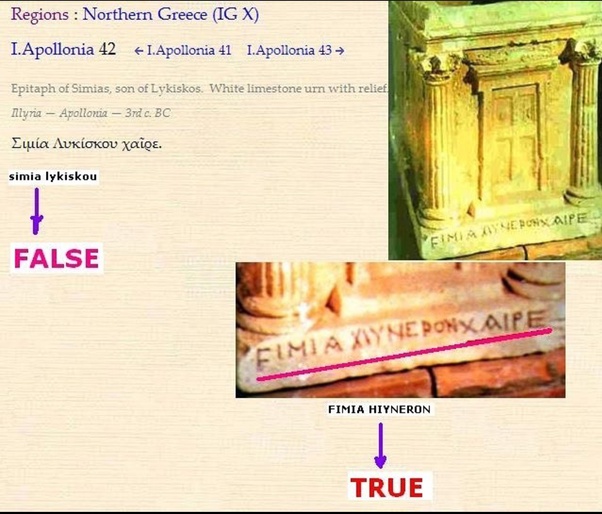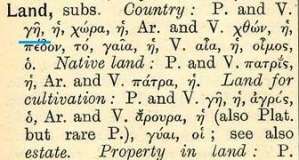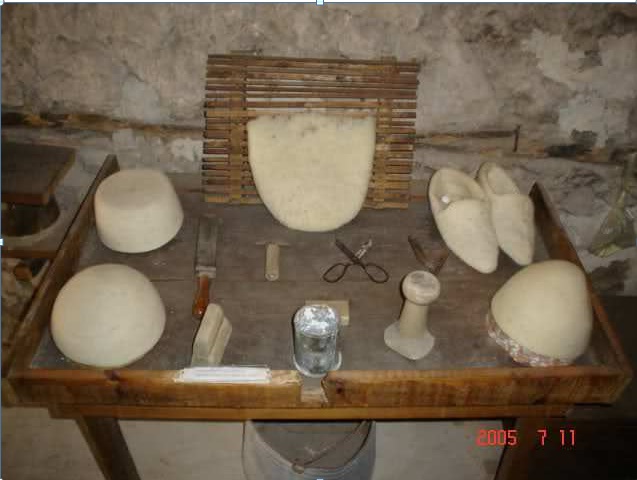Shouldn't be any debate, about
the concept, if the sun is a star or not and vice-versa, and not because the
Modern Astronomy says so. What is common between the sun and a star, is
the illu-mination concept. Now a concept or a thought is the
immediate post-action in our brain, after our perceptive senses, in our case
the sight, are affected by a phenomenon, in this case the sun and star
significant ability to "re-le-ase the li-ght". A thought is
like a silent word, or a silent sentence "read" or
"written" inside our brain. During their existence, different
cultures for example the Ancient Greeks, mastered to express and/or
graphically convey these "read" or "written"
"words" and "sentences", inside our brain, and they
'decided', to call it ἥλι(ος) or ἥέλι(ος)( in its archaic
form-Homeric) which is strikingly identical to the second part
"ielli" of the word Dielli=sun in Albanian. Semantically the word
Di-ielli, means "the day star" in Albanian, and is the final result
after a series of minor sound treatment and changes, since the real word for
"day" in Albanian is "dita", but the root "di" is
followed by the ending 't' and nominative "a", the same like :
dri-ta, na-ta, pa-ta, ty-ta etc.
(Similar root we can find in Latin 'dies', which obviously yield 'dia' in Spanish or 'diorno' becoming 'giorno' in Italian after dg-->g sound transformation or 'journée' in French which probably yields the "journey" in English.)
So in few words the terms ἥλιος or ἥέλι(ος) in Greek or Illi(ylli)[star] & Dielli(sun) are graphical representatives of a thought/s about a object/s which illu-minate/s.
Lexically and phonetically, now we are dealing again with involvement of an onomatopoeic syllabic supplement- structure: l+vowel, which happens to be a lexeme in Albanian 'le'=re-le-ase~lë-shoj(Al) unlike any other IE language.
Definition of illumination, in every culture is:
(Similar root we can find in Latin 'dies', which obviously yield 'dia' in Spanish or 'diorno' becoming 'giorno' in Italian after dg-->g sound transformation or 'journée' in French which probably yields the "journey" in English.)
So in few words the terms ἥλιος or ἥέλι(ος) in Greek or Illi(ylli)[star] & Dielli(sun) are graphical representatives of a thought/s about a object/s which illu-minate/s.
Lexically and phonetically, now we are dealing again with involvement of an onomatopoeic syllabic supplement- structure: l+vowel, which happens to be a lexeme in Albanian 'le'=re-le-ase~lë-shoj(Al) unlike any other IE language.
Definition of illumination, in every culture is:
1 : the action of supplying or
brightening with light or the resulting state. 2 : the luminous flux per unit
area on an intercepting surface at any given point — called also illuminance.
This "light
supply"(illumination) or the synonym brightening, is called
ndriç-im(ndritshim) in Albanian and is acquired : në drite(in
light)-->n(ë)dritë)--->ndrit(verb)=gleam=glitten=briten
The involvement of a primitive onomatopoeic structure such as l-e, is done due to the automatic semantic reflexes the palatal "l" carries as an ideo-sound [or as an ideograph, to imitate the sound or the phenomenon it suggests. The automatic deployment of a following vowel in this minor phonetic structure is inevitable, and its frequent shifting to a different vowel occurs due to deflection or in some rare case preservation and prevention. This change in a phonetic environment is very normal for the reason expressed above, and certainly for the reason that a language is a vivid organism, which always changes, without losing the DNA, making it distinct among other languages. While the following vowel might shift to a different one, during declension or word meaning expansion, the phoneme "l", will never le-ave, but always will serve as a vessel to carry that initial abstract meaning, which will not be lost even during the word meaning expansion or contraction.
Using this, is one path, to phonetically/graphically convey the illumination/sun~ star concept. In the case of a "star", Greek (and Latin) is using a different path, to achieve the same objective, coming from a different logics. It's called 'semantics transferability ', from Albanian to create certain dictionary in Greek. The word ἀστήρ (which predates the Latin 'aster'), is an adjacent compound word:
ἀστήρ= ἀ+στήρ
ἀ---> privative preposition = to English un or NOT
στήρ--> is the Albanian meaning sterrë=dark, black
The involvement of a primitive onomatopoeic structure such as l-e, is done due to the automatic semantic reflexes the palatal "l" carries as an ideo-sound [or as an ideograph, to imitate the sound or the phenomenon it suggests. The automatic deployment of a following vowel in this minor phonetic structure is inevitable, and its frequent shifting to a different vowel occurs due to deflection or in some rare case preservation and prevention. This change in a phonetic environment is very normal for the reason expressed above, and certainly for the reason that a language is a vivid organism, which always changes, without losing the DNA, making it distinct among other languages. While the following vowel might shift to a different one, during declension or word meaning expansion, the phoneme "l", will never le-ave, but always will serve as a vessel to carry that initial abstract meaning, which will not be lost even during the word meaning expansion or contraction.
Using this, is one path, to phonetically/graphically convey the illumination/sun~ star concept. In the case of a "star", Greek (and Latin) is using a different path, to achieve the same objective, coming from a different logics. It's called 'semantics transferability ', from Albanian to create certain dictionary in Greek. The word ἀστήρ (which predates the Latin 'aster'), is an adjacent compound word:
ἀστήρ= ἀ+στήρ
ἀ---> privative preposition = to English un or NOT
στήρ--> is the Albanian meaning sterrë=dark, black
STERRË mb.
1. Shumë i zi; shumë i errët. Natë sterrë. Me leshrat sterrë. U nxi qielli, u bë sterrë.
2. Shumë i ngrysur a i zymtë. U bë sterrë në fytyrë.
3. fig. Që u ka bërë shumë të këqija të tjerëve ose që u dëshiron të keqen, i zi; i përlyer. E ka ndërgjegjen sterrë. E ka shpirtin sterrë.
4. si ndajf. Shumë, fare (për ngjyrën e zezë). Sterrë i zi. I zi sterrë.
1. Shumë i zi; shumë i errët. Natë sterrë. Me leshrat sterrë. U nxi qielli, u bë sterrë.
2. Shumë i ngrysur a i zymtë. U bë sterrë në fytyrë.
3. fig. Që u ka bërë shumë të këqija të tjerëve ose që u dëshiron të keqen, i zi; i përlyer. E ka ndërgjegjen sterrë. E ka shpirtin sterrë.
4. si ndajf. Shumë, fare (për ngjyrën e zezë). Sterrë i zi. I zi sterrë.
carrying the same meaning with:
TERR m.
Errësirë. Terri i natës. Iku (u zhduk) nëpër terr. Erdhi për terr erdhi nëpër errësirë; erdhi në të errur, erdhi vonë. Dolëm nga terri.
Errësirë. Terri i natës. Iku (u zhduk) nëpër terr. Erdhi për terr erdhi nëpër errësirë; erdhi në të errur, erdhi vonë. Dolëm nga terri.
which derives again from:
ERR kal.
1. E mbaj dikë deri vonë natën, e vonoj derisa ta zërë nata. Më erri nata më zuri nata. Mos më err.
2. E bëj dikë të mos shohë fare a të mos shohë mirë për një farë kohe, e verboj.
Ia erri sytë dielli.
3. fig. E bëj të mjerë a fatkeq, nxij. Ia erri jetën.
* I erri sytë vdiq.
1. E mbaj dikë deri vonë natën, e vonoj derisa ta zërë nata. Më erri nata më zuri nata. Mos më err.
2. E bëj dikë të mos shohë fare a të mos shohë mirë për një farë kohe, e verboj.
Ia erri sytë dielli.
3. fig. E bëj të mjerë a fatkeq, nxij. Ia erri jetën.
* I erri sytë vdiq.
s(initial reinforcement sound) +t (vowel treated 'të' article) +err(make dark, not-visible-verb)
The compound word simply means: not-dark, since a star is the only object which illuminates in the night sky darkness and it's not result of any descendance from the presumed PIE root garbage.
This is not an isolated case in Greek, when semantics transferability protocol "borrowing" semantics from Albanian, is enforced. There are many, but one should have a deep understanding in Albanian, to realise that connection between two languages.
The word 'αφρός' seems to have no connection with its cognate in Albanian : 'shkumë'. But, the truth is that it borrows its meaning from another Albanian concept afr-oj=appro-ach . The sea-foam is an object in nature, which "the Greeks" have seen to always reach the coast, coming from a certain distance from the sea.
The word itself is used to name the "Morning Star"--Afro-dita, which roughly can be translated : "The day is approaching" which means the "Dawn is coming close". This post will help, to understand that the truth simply can't be hidden in darkness forever, the sun will bring the light, and it will be Aferdita, to signal it first.










